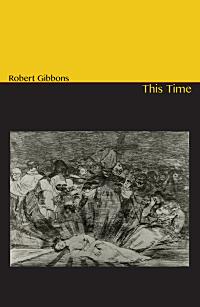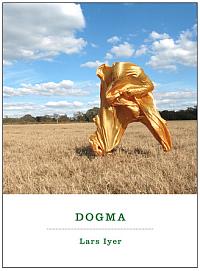|

photo - mw
_______________________
The heavens have fallen on our heads!...
(....)
We have the divinity of our great misery. And our solitiude, with its toilsome ideas, tears and laughter, is fatally divine. However wrong we may go in the dark, whatever our efforts in the dark and the useless work of our hearts working incessantly, and whatever our ignorance left to itself, and whatever the wounds that other human beings are, we ought to study ourselves with a sort of devotion. It is this sentiment that lights our foreheads, uplifts our souls, adorns our pride, and, in spite of everything, will console us when we shall become accustomed to holding, each at his own poor task, the whole place that God used to occupy. The truth itself gives an effective, practical, and, so to speak, religious caress to the suppliant in whom the heavens spread.
— Henri Barbusse
from a longer quote at Departure Delayed
_______________________
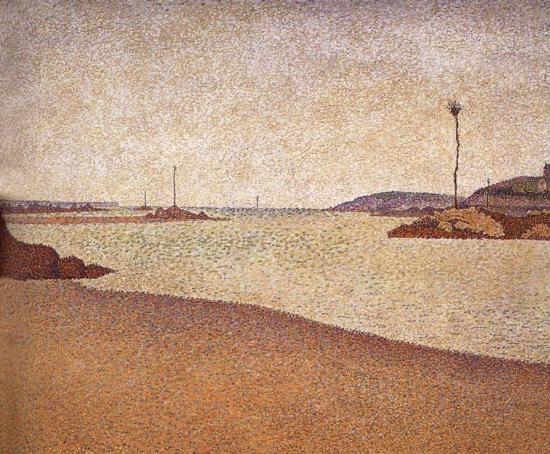
Paul Signac
d. August 15, 1935
_______________________
Poetry and/as revolution
Stephen Collis
jacket2
1.
Poetry doesn’t make anything happen
I’m not interested in a revolution you can’t dance to
This machine kills fascists
Things happen, and poetry is a thing, a making, and sometimes a happening
Where “thing” (ding) once meant “meeting place”—“assembly”—so we are such “things” as revolutionary dreams are made of
Mayakovsky: “the presence of a problem in society, the solution of which is only conceivable in poetic terms”
2.
In the mid-1980s I rode in a zodiac up an inlet in Clayoquot sound with a man who had been a student activist in Chicago in 1968, and had helped organize the protests at the Democratic National Convention. We were going to tend his oyster farm, and we talked about Neruda (his favourite poet), Chile (where he’d lived after fleeing charges in Chicago), and Neruda’s Memoirs (which I was then reading). The only thing I recall about that book is Neruda’s insistence that the poet always wear black, a rule I follow to this day
Mayakovsky: “Hey you! Heaven! Off with your cap!”
This roof that you call the sky, will it hold? Acrobats string lines between what we see and what we say. These barricades, they didn’t change anything, did they? The loose combatants now herd together on hills very near here. Are you aware that “a few men gather in caverns in SILENCE?” Tristan Tzara was a made-up name. “You twilight cloud, be Goya”
Adrienne Rich: “A revolutionary poem will not tell you who or when to kill, what or when to burn, or even how to theorize. It reminds you…where and when and how you are living and might live, it is a wick of desire”
...(more)
_______________________
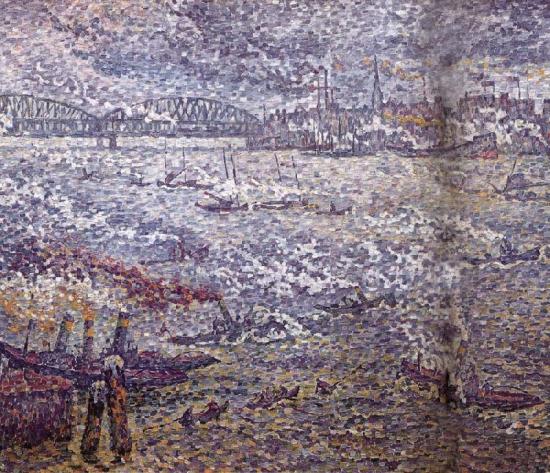
Rotterdam fog
Paul Signac
_______________________
The Veil of Opulence
Benjamin Hale
(....)
Nowadays, the veil of ignorance is challenged by a powerful but ancient contender: the veil of opulence. While no serious political philosopher actually defends such a device — the term is my own — the veil of opulence runs thick in our political discourse.
(....)
As this election season wears on, we will likely be hearing a lot about fairness. Romney recently signaled as much. Obama has been doing so for months. Far from a mere rhetorical concern, our two presidential candidates are each representatives of one of these views.
The question of fairness has widespread application throughout our political discourse. It affects taxation, health care, education, social safety nets and so on. The veil of opulence would have us screen for fairness by asking what the most fortunate among us are willing to bear. The veil of ignorance would have us screen for fairness by asking what any of us would be willing to bear, if it were the case that we, or the ones we love, might be born into difficult circumstances or, despite our hard work, blindsided by misfortune. Society is in place to correct for the injustices of the universe, to ensure that our lives can run smoothly despite the stuff that is far out of our control: not to hand us what we need, but to give us the opportunity to pursue life, liberty and happiness. The veil of ignorance helps us see that. The veil of opulence keeps us in the dark....(more)
_______________________

photo - mw
_______________________
Big data is our generation’s civil rights issue, and we don’t know it
What the data is must be linked to how it can be used.
Alistair Croll
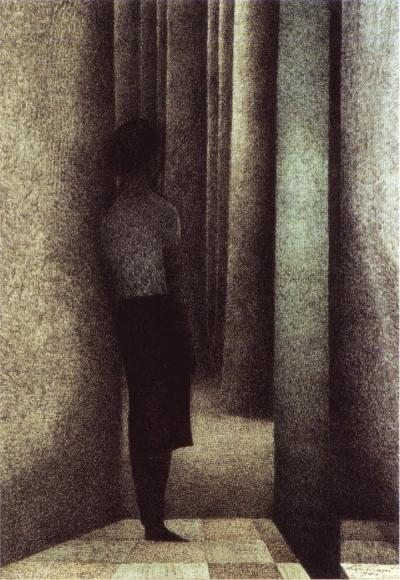
Léon Spilliaert
_______________________
Labyrinth 58-62
Oliver de la Paz
the offending Adam
Labyrinth 60
The boy in the labyrinth knows everything depends on where you stand. What is in the
foreground defies the background in such exaggerated lines. As light shined behind
parchment grows the wrought letters into rivers, heavy with the profundities of their
lineation. How sunlight strikes an apple tree and how the weight of that tree swells the
outward feel of its fat and beautiful fruit. The scale is not a concept. It is a veil. The boy
in the labyrinth knows the array. His concentration compressed by the boundaries
where he is concerned: his body and his body. All others are relative. He imagines his
body as a sheet of blackened glass. How his senses are seen through it if one peers
...(more)
more from LabyrinthAt Length
Oliver de la Paz
_______________________
House of Halls
Joe Aguilar
conjunctions
The Symbolic
It means repression. It means masks. It means sadness.
It means haunting. It means the old veined through the new. It means the right hand keeping secrets from the left hand. It means parent and child.
It means the body with organs (house) in the body without organs (desert).
It means the interreliant body and soul. It means rest frustrated by motion and motion slowed by rest. It means the unhappy link between right and left brain.
It means Germany before World War I. It means Germany after World War II.
It means irreconcilable class division.
It means the Internet.
It means antebellum America.
It means a relationship held together only by destructive patterns kept hidden by both parties in a kind of tacit agreement.
It means critique of fatuous modern life. It means a weak hope.
It means hunger. It means Vikings.
It means base and superstructure. It means kitsch as art.
It means double articulation. It means immanence.
It means double helix. It means form and no form.
It means mind under matter. It means progress arrested by progress.
It means society paralyzed by the strain between the ideals of democracy and the reality of free enterprise. It means loneliness.
...(more)
_______________________

photo - mw
Riverwilt
Nomura Kiwao
Translated from Japanese by Angus Turvill
The riverwilt I must set down
Before the riverwilt pulls me down
Can I get across—Walk across?
(In front of the house, they’re not there now, but in an oak tree, where branches spread out like a maze, they’re not there now, but like a place where echoes gather, where tree spirits gather, I climbed to a fork in the tree, and just as I was dozing off, no that’s not right, reading some erotic, no that’s not right, more gynaecological, probably that kind of book)
Can I get across—
Walk across?
(Reading that kind of book excitedly, unexpectedly my mother, unexpectedly)
The transient
Border realm of snake
Its breathing gentleness of skin,
(That’s right, my mother unexpectedly came to the foot of the tree, there’s a snake in the house, she said, her face pale, I jumped down toward that writhing neck omen of bad fortune, I loped toward it, but the book, what did I) ...(more)
New Writing from Japan, Part IIWords without Borders August 2012
Guest Editor Michael Emmerich
_______________________
The Latest Word
Curtis White
electronic book review
(....)As Andrei Codrescu wrote in his prescient book The Disappearance of the Outside:
The notion of community has been stripped of its direction. No longer does community - any community - stand outside the State, in direct challenge to it. All communities have been reoriented through a neat trick of generalization to become the State, an electronic Superstate that is a combination of traditional nationalism and electronic globalism. When community was a means of resistance, it was constituted to point from the inside out: it proceeded from a center of internal concerns to make progressively wider contacts with the outside world. The community redesigned by the State points inward: it is a producer of silence. (sic, 197)
In the era of the Web, we might now add, yes, but it is a voluble silence.
Inseparable from this social damage is a very personal damage. The Web is the largest, most sophisticated diversion machine in human history. As entertainments always have, the Web diverts us from thinking about how empty we are. As Pascal wrote, "The only thing that consoles us for our miseries is diversion, and yet this is the greatest of our miseries". We fill ourselves with the Web's chatter and the Web's busyness, but when our laptops and smart phones are taken from us we are thrown immediately back into our ancient human anxiety about being nothing. If we can't text, and tweet, and email, we discover ourselves to be ontologically empty, just as we've always been. And so, in a panic, back to that cold digital embrace we return.
William Carlos Williams, just one more time: "It is difficult / to get the news from poems / yet men die miserably every day / for lack / of what is found there" (emphasis added, "Asphodel" 161-162).
We are creatures of lack, manqué, as Sartre put it grimly. The Web reassures us about the hole at the center of us by providing its endless chatter. The leveling effect of Amazon makes even the best intended artist or thinker a mere "content provider" for that hole whether she likes it or not. Even this essay succumbs to that implacable dynamic, God help me.
...(more)
.....................................................
Can the Web Save the Book? A Reply to Curtis White's The Latest Word
Hans Kristian Rustad
electronic book review
(....)
I believe White stages a healthy skepticism toward the increasing power that publishers, agents and editors govern (as he also expresses in his ebr review of David Shields’ book), and his hostility towards Amazon's increasingly domination in the book market is crucial and urgent. Perhaps it is true that the book industry is less willing to publish literature that is not mainstream bestsellers. Perhaps they tame book literature. And perhaps we won't see a book that wants to blow up Amazon, published and sold on Amazon.
But really? To what extent is the web a prison? Could the situation rather be the opposite, that is, that the web is the solution to the critical situation of contemporary novels?
...(more)
ebr (version 5.0)
_______________________
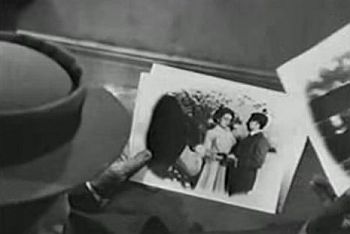 
Film - By Samuel Beckett
starring Buster Keaton
youtube
The Complete Short Prose, 1929-1989
Samuel Beckett
read by Graeme Malcolm
ubu
_______________________
Everything is a Remix: The TED Talk
The myth of the solitary inventor -- in 8 short stories
Derek Thompson
It would seem that eureka is Greek for "oops."
The Myth of the Sole InventorMark A. Lemley
_______________________
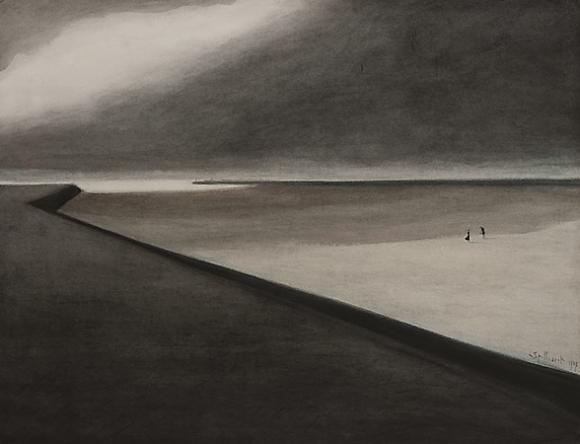
Léon Spilliaert
1881 - 1946
_______________________
Theoria as Eudaimonia
Max Murphey
(....)Why should we think that the ability to provide demonstrations is a necessary condition for eudaimonia? If eudaimonia is theoria , it need not involve the ability to demonstrate its knowledge. Theoria simply involves contemplating one’s knowledge of the highest objects; this knowledge is not itself the result of demonstration, but rather the starting point for all demonstration. For the highest object is the divine nous , the fully reflexive activity of thinking which knows itself to be the highest object. Human theoria , by progressing towards this divine reflexivity, contemplates this very activity of progress as the most divine activity of which human beings are capable. This is eudaimonia : it is not the exclusive scholastic project of constructing philosophical demonstrations, but a universally achievable state of reflexive contemplation....(more)
_______________________
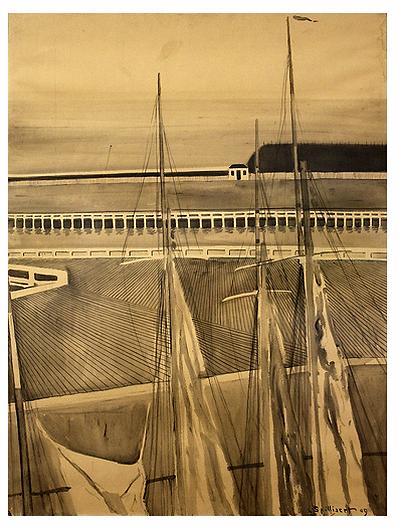 Léon Spilliaert

Children, Anon.
Terry Castle
paris review
(....)As addictions go, collecting old photos of obscure provenance may be harmless enough. Indeed, the habit might seem easy to peg as one of the fast-expanding subdivisions of the Great American Nostalgia Industry—along with scrapbooking, rubber-stamping, collecting Pez dispensers or Barbies still mint in their boxes. Now that digital photography has made just about every older image-making process obsolete, even the prints and Polaroids of only ten or twenty years ago have begun to look quaint and vestigial. Collecting them is like dragging out one’s old Joy Division albums.
But in the case of a Mrs. Jones like mine—outsize, never lets up, a bit reckless—two questions would seem to arise. First, and most glaring, why would one want to own a closetful of pictures of people one doesn’t know? Second, assuming the desire is there, on what basis to choose them? Why pluck from obscurity, say, two or three examples out of a junk-store shoebox? ...(more)
_______________________
After an unscheduled hiatus occasioned by some non-serious but nevertheless discomfiting health problems, I'm back. Posting may be a little erratic for a while.
—mw
_______________________
The Aesthetics of Silence
Susan Sontag
(....)Art is not consciousness per se, but rather its antidote — evolved from within consciousness itself. (The critical principles generated by this myth were much harder to get at.)
The newer myth, derived from a post-psychological conception of consciousness, installs within the activity of art many of the paradoxes involved in attaining an absolute state of being described by the great religious mystics. As the activity of the mystic must end in a via negative, a theology of God's absence, a craving for the cloud of unknowingness beyond knowledge and for the silence beyond speech, so art must tend toward anti-art, the elimination of the "subject" (the "object," the "image"), the substitution of chance for intention, and the pursuit of silence....(more)
Aspen no. 5+6, item 3
The Minimalism issue 1967
_______________________
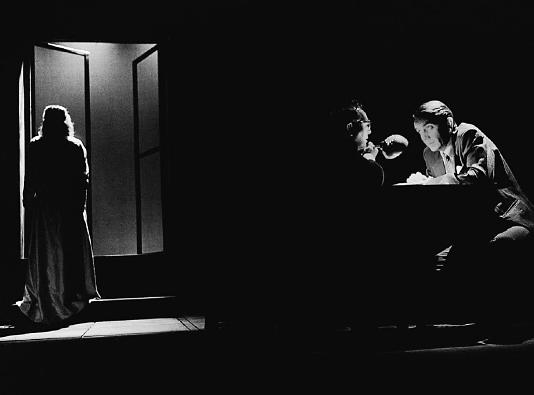 Phelim Drew, John Olohan and Robert O'Mahoney
in
Rough for Theatre II, 1999
Images of Beckett [pdf]
Photographs by John Haynes
Text by James Knowlson
_______________________
What is iconoclash? [pdf]
Or is there a world beyond the image wars?
Bruno Latour
... we are digging for the origin of an absolute – not a relative – distinction between truth and falsity, between a pure world, absolutely emptied of human-made intermediaries and a disgusting world composed of impure but fascinating human-made mediators. “If only, some say, we could do without any image. How so much better, purer, faster our access to God, to Nature, to Truth, to Science could be.” To which other voices (or sometimes the same) answer: “Alas (orfortunately), we cannot do without images, intermediaries, mediators of allshapes and forms, because thisisthe only way to access God, Nature, Truth and Science.” It is this quandary that we want to document, to fathom and, maybe, to overcome. In the strong summary that Marie-José Mondzain proposed of the Byzantine quarrel over images, “La vérité est image mais il n’y a pas d’image de la vérité.” (Truth is image, but there is no image of truth.) _______________________
For Robin Blaser
Matthew Zapruder
I don't think much
of what you thought of
when you lived not too far from here
with the relaxed golden
godless beautiful people
that was many years before
unbitterly you went to live
north among
the very old magic lack of sunlight
now that I live here
I don't think too much
I just sit in my chair
and maintain
the distinction?
just me sitting here
the window and what's outside
someone else's presence
is not with me
and therefore with me
Floating Wolf Quarterly
_______________________
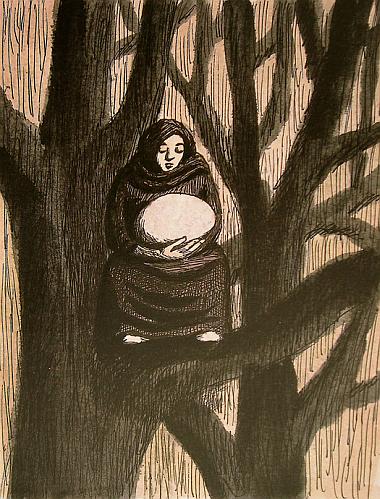
Franco Matticchio
50 Watts
_______________________
A Tom o' Bedlam Song with British & Nootka Analogues (poem & commentary)
Outsider Poems, a Mini-Anthology in Progress (43)
presented by Jerome Rothenberg
The Song (Circa 1600)
From the hagg and hungrie goblin
That into raggs would rend ye,
And the spirit that stands by the naked man
In the Book of Moones - defend ye!
That of your five sound senses
You never be forsaken,
Nor wander from your selves with Tom
Abroad to beg your bacon.
While I doe sing "any foode, any feeding,
Feedinge, drinke or clothing,"
Come dame or maid, be not afraid,
Poor Tom will injure nothing.
...(more)
|

